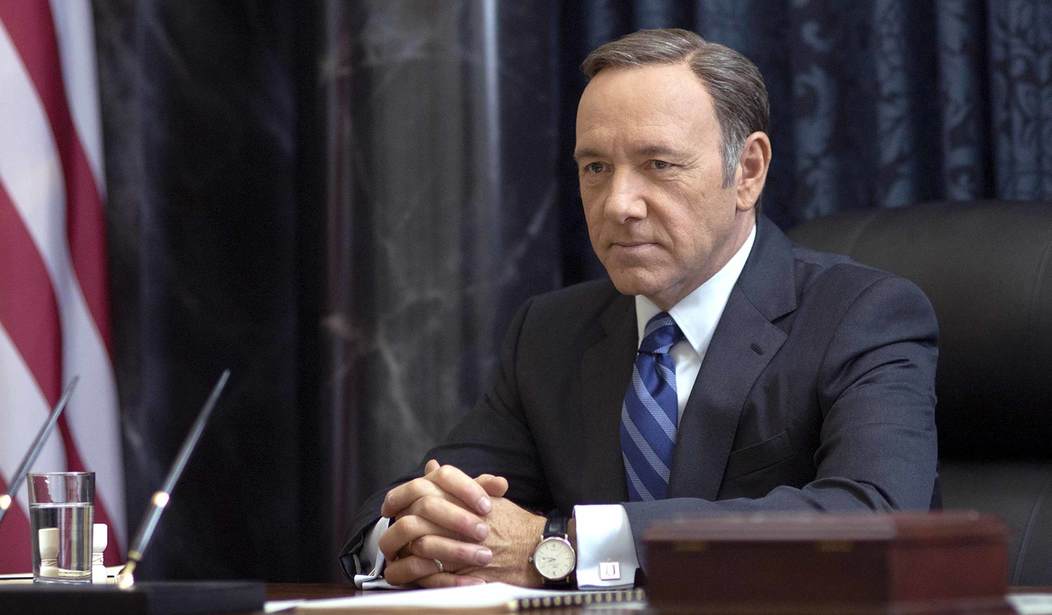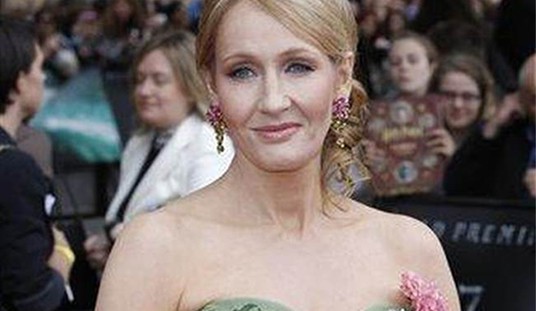“House of Cards” Season 1 was impressive: it introduced the scheming, ambitious, morally depraved Underwoods and their machinations for power. It was engrossing, moved swiftly, and proved mostly believable. Seasons 2 and 3 got bogged down with needless intrigue and confusing subplots, but Season 4 is back on point, with a vengeance.
The Spirit of Corruption and Power
Few shows meld political power with careful scheming in the manner of “House of Cards.” Frank Underwood (Kevin Spacey) knows how to manipulate people, leading them to perform his bidding, often by urging them do the opposite. In Season 1, he convinces Congressman Donald Blythe (Reed Birney) to surrender the lead on major legislation — by insisting that Blythe take that lead himself. This manipulation is on full display in Season 4.
Season 4 opens with a presidential game of cat-and-mouse, where Frank and his wife Claire (Robin Wright) jockey for leadership. Both plans are masterful, but only one can prevail.
In one particularly strong scene, Frank details the strongest weapon of his likely Republican opponent, Will Conway (Joel Kinnaman). Conway is working with the meta data firm Polyhop to gain access to information which will enable him to target voters and win the election. Frank gets a wonderfully evil and corrupt idea on how to combat this technological wonder:
Imagine a duel, me and Conway. Now Conway has a powerful gun, a search engine. It’s powerful because, with it, he can tell what you think, what you want, where you are, and who you are. He can turn all those searches into votes, and that’s enough bullets to kill my chances of winning. But I have an even bigger gun — it’s called the NSA, one of perks of being president…I can see you, and I can use what I see to rig this election.
Underwood is remarkably Frank (forgive the pun) when addressing the audience with his plans, and he knows just what leverage to use to accomplish his goals. In some ways, this makes him an effective leader, but he only uses that leadership in pursuit of his own power.
The structure of the preceding three seasons seemed to hint at a pattern: Frank seeks to gain power and he rises in Seasons 1 (to the vice presidency) and 2 (to the presidency). Then in Season 3, he begins to be suffocated by his own machinations — the “House of Cards” collapsing on itself. This was to be expected, but did not happen in a convincing manner, and one of the main problems with Season 3 was that it seemed to make the whole series too transparent.
Two seasons of gaining power, followed by a season or two of that power collapsing seemed too neat, and not compelling. The decision to reverse that trend and make Season 4 focus on Frank gaining power again saved the series from itself.
Next Page: The Characters Bring “House of Cards” to Life
Acting and Cinematography
Kevin Spacey brings great gravitas and deviousness to the role of ambitious manipulator. He plays not just a powerful president, but a great schemer behind the facade. The same is true of Robin Wright, whose canny and conflicted Claire proves capable of great feeling and compassion one moment, and ruthless calculation the next. Her character proves even more compelling in this season than previously, as she schemes against her husband and then channels that ambition in new ways.
Joel Kinnaman (Will Conway) and Dominique McElligott (his wife, Hannah) make two strong additions. Their marital romance is remarkably modern — every moment posted live on Instagram — and their innocent children witnessing the corruption of power bring a dark kind of light-heartedness to the show.
Side characters, from campaign strategist Leann Harvey (Neve Campbell), Claire’s mother Elizabeth Hale (Ellen Burstyn), and journalist Tom Hammerschmidt (Boris McGiver) also give stellar and intriguing performances. Each character is multifaceted — ambitious but also curious and unpredictable. This makes them more difficult for Frank to manipulate.
Beat by beat, Season 4 moves seamlessly from plot point to plot point. As in Season 1, the reveals are careful, and always leave you hungry for more. At the same time, these cliffhangers are natural, not artificial. Some shows will throw a surprising event into the mix with the sole purpose of causing spectacle and drawing attention. These surprises often do not serve a true purpose in the story, but are clever window-dressing to keep the audience intrigued.
In Season 2, for example, the show kills off crack reporter Zoe Barnes. Frank’s decision to bump her off makes sense, and he had warned her once previously, but her death seemed fundamentally unearned in the story. It surprised the audience, but the buildup was insufficient for such a powerful event. Contrast this with the beheading of Ned Stark in the first season of “Game of Thrones.” Stark had slowly and stubbornly followed one course of action which would lead to this result, throughout many episodes. His death was surprising, but made sense.
This discipline of earned surprises flows throughout Season 4 of “House of Cards.” Even the most surprising events in this season serve the greater plot and are developed in such a way as to be not only believable but almost cathartic. This is how television was meant to be.
Such discipline also contributed to the notable lack of episodes which could be considered boring. While some intrigue between Chief of Staff Doug Stamper (Michael Kelly) and communications director Seth Grayson (Derek Cecil) became tedious, it was kept to a minimum, unlike Stamper’s intrigues in Season 3, which arguably detracted from the story.
Season 4 again mimics Season 1 with incredible dialogue. Words are cutting, and yet eloquent — one of the strongest points of the series’ original start. Characters say just enough to get their point across, without becoming “talky.” In Seasons 2 and 3, by contrast, there is often too little dialogue, or too much. Action and intrigue require just the right mix of words to explain them, and Season 4 excels in the same way as Season 1.
Next Page: Politics and a Dark Finish — WARNING: Spoilers
Politics and an Incredibly Dark Finish — Spoilers
“House of Cards” has featured evil deeds on behalf of Frank Underwood, but the season finale takes the cake. Frank’s decision to orchestrate a war in order to bury the story of his own misdeeds is masterful — but it shows the utter depravity in his soul. He decides to hazard the lives of thousands of Americans on a chance to escape the destructive scandal Tom Hammerschmidt has unearthed, and perhaps to clinch his election against Conway.
This plot point echoes the conspiracy theorists’ contentions that George W. Bush started the Iraq War for reasons others than American security — be it oil or post-9/11 domestic tension. The war may have been a mistake, but it seems grasping at straws to blame Bush solely for it. The Atlantic’s Spencer Kornhaber notes this view, but also mentions that this is a theme of American history. The allegation of American wars started to achieve domestic goals is tied to the first Gulf War, and even World War II by satirists and conspiracy theorists. He understates his case, as conspiracies have been alleged behind even more American wars.
For political realism, the show gets high marks for the assassination attempt against Underwood, which makes his favorability numbers increase and leads his Democratic party challenger to drop out. This is true to life, as no presidents are as popular as the ones who get shot while in office (see Ronald Reagan and John F. Kennedy). The show also introduces other modern issues well and only screws up one particular political issue, gun control.
The final episode features two very revealing bits of dialogue — between Frank and Hammerschmidt, and between Claire and the leader of ICO (Islamic Caliphate Organization — a fictional equivalent of the Islamic State, also known as ISIS). In his chat with Hammerschmidt, Frank revealed the final defense of his deplorable deeds:
Frank: Name me a president you wouldn’t describe in exactly the same way. We’re all ruthless. We all destroy. But corruption, that’s a matter of perspective.
But Hammerschmidt had the ultimate accusation: That’s the same reasoning dictators use.
Indeed. As the 2016 election continues, both sides have seen presidential candidates call for extra-constitutional powers that verge on authoritarianism. This exchange reveals Frank’s depravity, but also his utilitarian ethos — in the words of Hillary Clinton, “I’m a progressive who gets things done.”
Claire’s chat with Yusuf Al-Ahmadi (Farshad Farahat) shows a similar disillusionment and focus on achieving direct goals.
Claire: We expel the Ba’athists and you go from a bureaucrat to an extremist. But you’re a well-educated man, Yusuf, and you don’t care about Islam or the Caliphate — you’re just using that to radicalize soldiers.
Ahmadi: Just as you use democracy and freedom.
Claire: So now we understand each other.
Claire admits that she and her husband use the ideals of the United States to manipulate men and women — particularly soldiers — to do their bidding. As Ahmadi does not believe in Islam, but for political ends, so Claire and Frank do not believe in freedom and democracy. Any viewer who has seen even one episode of “House of Cards” is well aware of this, but the way in which Claire expresses it so bluntly is masterful.
Season 4 closes with the brutal execution of an American hostage by terrorists. This suggests that the show is moving into even darker territory — so buckle up, you haven’t seen anything yet.









Join the conversation as a VIP Member